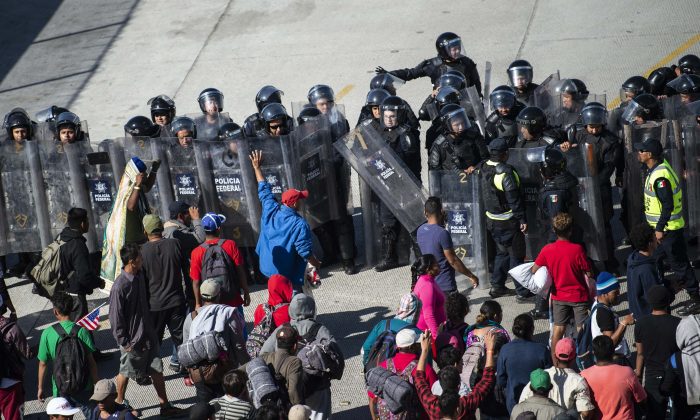A federal judge blocked the Trump administration’s rule that requires asylum seekers to first seek protection in countries they had passed through on their way to the U.S.-Mexico border.
The rule, known as the “third-country asylum rule,” aims to reduce the number of meritless asylum claims that placed an overwhelming strain on the U.S. immigration system. It operates under the premise that the asylum seekers who are fleeing their countries of origin because of fear persecution or torture on the basis of race, religion, nationality, membership in a particular social group, or political opinion should first seek protection in the first safe country they reach.
U.S. District Judge Timothy Kelly in Washington ruled late Tuesday that the Trump administration had not followed federal law known as the Administrative Procedure Act (APA) when the rule was issued in July 2019. Kelly said the rule was “unlawfully promulgated” because the federal government failed to abide by the APA’s notice-and-comment requirements, and had provided insufficient justification for not meeting those requirements.
The Justice Department (DOJ) and the Department of Homeland Security, who jointly published the rule, argued that notice-and-comment procedure would have been impracticable and might cause smugglers to communicate the impending effects of the rule to potential asylum seekers, thus creating a risk of a surge of asylum seekers at the southern border. The departments also argue that the rule has a foreign affairs function and is connected to ongoing international negotiations.
“The Departments rely on a single newspaper article that does not even directly address the key predictive judgment in question: the likelihood of a surge in asylum seekers so great and so rapid as to threaten human life or defeat the purpose of the Rule if notice-and-comment procedures were followed,” Kelly wrote addressing the departments’ reasoning that the notice-and-comment procedure would lead to a surge in asylum seekers (pdf).
The judge also noted that he did not address claims regarding the validity of the rule brought by the plaintiffs, several asylum seekers, and immigrant-services organizations.
The ruling on Tuesday represents a setback for the Trump administration and President Donald Trump, who has taken a hard-line against illegal immigration at the southern border. The ruling also follows a Supreme Court decision on June 18 that aimed to end an Obama-era program that provided legal protections and work authorizations to illegal immigrants who were brought into the United States as children, known as the Deferred Action for Childhood Arrivals program, or DACA.
The United States has faced an influx of asylum claims in recent years as smuggling groups and economic migrants have taken advantage of legal loopholes and a strained system.
The administration says the number of cases referred to the DOJ for proceedings before an immigration judge had more than tripled between 2013 and 2018 but only a small minority of these individuals is ultimately granted asylum.
The Department said the third-country asylum rule seeks to curb the influx of asylum seekers by “more efficiently identifying aliens who are misusing the asylum system to enter and remain in the United States rather than legitimately seeking urgent protection from persecution or torture.” The rule aims to deter aliens whose claims lack merit and allow the United States to prioritize claims of others who have no other options or have experienced extreme forms of human trafficking. It also contains three limited exceptions, including for individuals who can show they are a “victim of a severe form of trafficking in persons.”
Meanwhile, experts say the rule was “long overdue” and could strengthen the U.S. asylum system.
“We can’t let people that make up the majority of asylum-seekers, who are not qualified, bring down the system and prevent truly qualified asylum-seekers from accessing protection,” Jessica Vaughan, director of policy studies at the Center for Immigration Studies, told The Epoch Times last year when the rule was promulgated.
The rule had faced a number of court challenges soon after it was issued. The Supreme Court last year lifted a nationwide injunction blocking the third-country asylum rule from being enforced, which was granted by a district court judge in a separate case.
Claudia Cubas, Litigation Director at CAIR Coalition, one of the groups that sued over the rule, welcomed the decision.
“By striking down this rule, Judge Kelly reaffirmed two fundamental principles. The protection of asylum seekers fleeing for safety is intertwined with our national values and that the United States is a country where the rule of law cannot be tossed aside for political whims. For many of the individual asylum seekers we fight alongside, this ruling removes an unjust barrier to security,” Claudia Cubas, Litigation Director at CAIR Coalition, said in a statement.
The DOJ did not immediately respond to The Epoch Times’ request for comment.
Charlotte Cuthbertson contributed to this report.
Focus News: Federal Judge Sets Aside Trump Administration’s Third-Country Asylum Rule
UK Offers Path to Citizenship to 3 Million Hongkongers After China Imposes National Security Law
